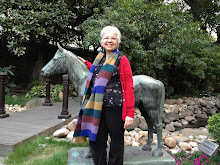Small people talk about others. Average people talk about things. Great people talk about ideas! - Adapted from a quotation by Eleanor Roosevelt
Years ago, a fellow education student shared this truism with me over some cheese and a loaf of many-day-old French bread while we avoided studying for finals. The two of us gossiped about instructors and classmates. Sometimes we considered things such as our inoperative cars. Rarely did we happen across anything that might have been mistaken for a great idea. I do remember thinking about the quotation again when considering levels of communication that influence children’s language acquisition.
In order to talk about Eleanor-Roosevelt-worthy ideas, children need vocabulary, words on which to hang their thoughts. In many households, communication between child and parent consists of "kitchen" English. “Come in.” “Shut the door.” “Sit down.” “Eat.” Little meaningful interaction or language acquisition happens in these conversations. It is only if an adult has the time and/or energy that communication moves to the next level, talk about others, e.g. “What ticked Grandma off this time?” It takes even more time and effort to reach the point where the child in included in conversations about things. “We need to figure out how to get that car started.” Rather than dismiss the chance for a child to discuss others and things as “small” or “average,” I celebrate any conversation in which a child is given the privilege to interact in ways that develop the vocabulary of socialization and practical problem-solving.
Still, I agree with Eleanor. Great people talk about ideas. In order to talk about ideas--mathematics or world peace, for example--a child needs experiences with the words that define those ideas. The struggle to provide the necessities of life deprives many parents of the time and energy to discuss ideas with their kids and don’t get me started on how the struggle to teach to standardized tests inhibits meaningful conversation in classrooms. Words, and the concepts they represent, are the framework upon which thought is built. Just as talking with an adult about others and things develops a child’s language and thought processes about those subjects. Talking about ideas provides the language of ideas needed for greatness. Children’s literature can help. Adults and children naturally share ideas over a good book. (Come on now, you can’t say you’re surprised this is where I was headed.) A whimsical storybook that introduces mathematics vocabulary like “rectangle,” “triangle,” “square” and “parallelogram” in a non-threatening way gives children the words on which to build ideas about informal geometry. A modern translation of the second chapter of Luke is appropriate for acquiring the vocabulary of the season of prayer for “peace on earth good will amoung men.” And on that note: Have a blessed Christmas, if I don’t see you before then!
Wednesday, December 2, 2009
Subscribe to:
Post Comments (Atom)

No comments:
Post a Comment